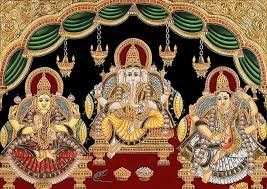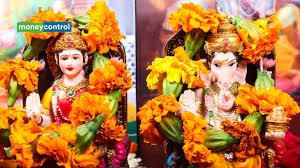The Significance of Worshipping Gods and Goddesses on Diwali
Diwali, known as the Festival of Lights, is one of the most celebrated festivals in India, symbolizing the victory of light over darkness and good over evil. This festival is marked by the worship of various gods and goddesses, each representing different aspects of life and prosperity. The worship rituals during Diwali are deeply rooted in tradition and mythology, with specific deities associated with the festival.
The Role of Goddess Lakshmi
One of the most important deities worshipped during Diwali is Goddess Lakshmi, the goddess of wealth, prosperity, and fortune. Devotees perform Lakshmi Puja on the night of Diwali to invite her blessings into their homes. The worship includes offering sweets, fruits, and flowers, as well as lighting diyas to symbolize the removal of darkness and ignorance. Many people believe that the more diligently they worship Lakshmi, the more prosperous the upcoming year will be.
Lord Ganesha: The Remover of Obstacles
In addition to Goddess Lakshmi, Lord Ganesha is also worshipped during Diwali, particularly on the first day of the festival, known as Dhanteras. Ganesha, the remover of obstacles, is invoked at the start of any new venture or initiative. His presence is believed to bring success and harmony to the family. Rituals often include the chanting of mantras, offering modaks (sweet dumplings), and setting up idols of Ganesha in homes.
The Significance of Lord Rama
The celebration of Diwali is also linked to the return of Lord Rama to Ayodhya after defeating the demon king Ravana. This narrative is significant in Hindu mythology, as it exemplifies the triumph of good over evil. To commemorate this event, devotees light lamps and fireworks to celebrate Rama’s homecoming, symbolizing the victory of righteousness.
Community and Family Bonding
Diwali is not only a religious occasion but also a time for family gatherings and community bonding. The act of worshipping gods and goddesses creates a sense of unity among families and communities. People come together to celebrate, exchange gifts, and share festive meals, reinforcing social ties and cultural values.
Conclusion
The worship of gods and goddesses during Diwali encapsulates the essence of this vibrant festival. It is a time for spiritual reflection, gratitude, and the renewal of faith in divine blessings. Through these rituals, individuals and communities seek to enhance their lives with prosperity, happiness, and goodwill.

Why This News is Important
Cultural Significance of Diwali
Understanding the reasons behind worshipping gods and goddesses during Diwali offers insights into the rich cultural heritage of India. Festivals are an integral part of Indian society, reflecting the values, beliefs, and traditions that have been passed down through generations. Recognizing these traditions fosters appreciation and respect for diverse cultures, essential for fostering unity in a multi-religious society.
Economic Implications
The celebration of Diwali also has economic significance. The festival is a peak season for businesses, particularly in retail and e-commerce. By understanding the cultural practices associated with the festival, students preparing for government exams can grasp the socio-economic dynamics at play, which may be beneficial for roles in public administration, policy-making, and economic development.
Social Cohesion
The collective observance of Diwali rituals promotes social cohesion among diverse communities. Studying how festivals like Diwali serve as a unifying force can help students understand the importance of social harmony and the role of cultural events in maintaining societal peace. Such knowledge is crucial for future civil servants and community leaders.
Historical Context
The celebration of Diwali dates back thousands of years, with its roots intertwined in various historical events and mythologies. The festival’s origins can be traced to ancient Indian texts like the Ramayana, which narrates the return of Lord Rama to Ayodhya after defeating Ravana. Additionally, Diwali has been linked to the harvest season, marking the end of the monsoon and the beginning of the agricultural cycle. The practice of worshipping deities during this festival is deeply embedded in Hindu traditions, signifying hope, prosperity, and renewal.
Key Takeaways from “Why Gods and Goddesses are Worshipped on Diwali”
| Serial Number | Key Takeaway |
|---|---|
| 1 | Diwali is a major Hindu festival celebrating light over darkness. |
| 2 | Goddess Lakshmi is worshipped for wealth and prosperity. |
| 3 | Lord Ganesha is revered as the remover of obstacles. |
| 4 | Diwali commemorates the return of Lord Rama to Ayodhya, symbolizing the triumph of good over evil. |
| 5 | The festival promotes family bonding and community unity through shared rituals. |
Important FAQs for Students from this News
1. What is Diwali?
Diwali, also known as the Festival of Lights, is one of the most celebrated festivals in India, symbolizing the victory of light over darkness and good over evil.
2. Why is Goddess Lakshmi worshipped during Diwali?
Goddess Lakshmi is worshipped during Diwali for blessings of wealth, prosperity, and fortune. The rituals conducted on this occasion aim to invite her blessings into homes.
3. What role does Lord Ganesha play during Diwali?
Lord Ganesha is worshipped at the beginning of Diwali, especially on Dhanteras, as the remover of obstacles. His blessings are sought for success and harmony in new ventures.
4. How does Diwali promote social cohesion?
Diwali encourages family gatherings, community celebrations, and shared rituals, fostering social ties and cultural values among diverse groups.
5. What is the historical significance of Diwali?
Diwali’s historical significance is rooted in various mythologies, primarily the Ramayana, where it commemorates the return of Lord Rama to Ayodhya after defeating Ravana.
Some Important Current Affairs Links

















